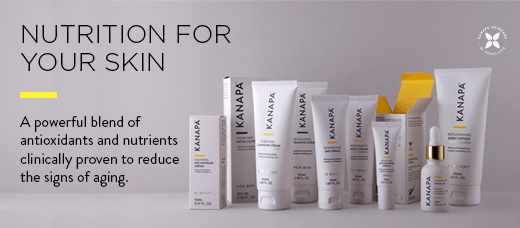|
Today’s skincare industry is oversaturated with claims of miracle anti-aging ingredients that will turn back time and give you the dewy, unlined and unblemished skin of a child.
While we all know nothing can actually turn back the clock, some ingredients do have remarkable antioxidant properties that hydrate skin while fighting free radical damage. But what does that even mean? We’ve come up with a few powerhouse ingredients you should definitely incorporate into your skincare regime. But first, we’ll start at the beginning.
What are antioxidants?
The human body is made up of different substances such as protein, fat and DNA, which are basically large molecules – thousands of atoms joined together. In order for a molecule to be stable, it has to contain the right number of electrons. If it loses an electron when it isn’t supposed to, it can turn into a free radical.
Antioxidants are molecules that protect your skin cells from damage caused by free radicals - unstable molecules that can damage other molecules and harm cellular structure. This is where antioxidants come in.
Without antioxidants, free radicals would destroy our bodies very quickly, however they also play an important function, such as killing bacteria that try to infect us. So, we need a balance of the right number of free radicals in our body, and antioxidants to keep them in check. When that balance is off, things can go wrong.
Oxidative stress, which can damage important molecules in the body, is caused when there are more free radicals than antioxidants.
Prolonged oxidative stress can contribute to the aging process
Antioxidants can occur naturally in plants, fruits, vegetables, teas, etc, but they can also be man-made. Antioxidants in skincare can improve skin’s elasticity by fending off free radical damage and delaying the effects of aging, while reducing the appearance of wrinkles, hydrating, and helping to improve skin tone and discoloration, including dark spots, scars and rosacea.
Essential fatty acids
Essential fatty acids are a superior type of “good fat”, something your body needs but can’t get from other fats in your diet.
The two main types of essential fatty acids are linoleic acid, also known as Omega 6, and alpha-linolenic acid, known as Omega 3. Our body does not produce these naturally, so the only way for us to get them is from food. They have a wide range of benefits for skin health when taken internally and used externally in skincare.
Omega 6 can help with eczema, psoriasis, inflammation and redness, as well as minimizing oily skin by helping skin flush out toxins, which reduces the clogging of pores.
Omega 3 can help the skin’s cell walls maintain flexibility and improve circulation and oxygen uptake. As our body ages, its ability to retain moisture diminishes. As a result, visible signs of aging become more prominent and skin is less supple. Omega 3 helps retain water within the skin which helps reduce the visible signs of aging, as well as improving the appearance of cellulite.
Some sources of omega 6 and 3:
Rosehip oil
Evening primrose oil
Flaxseed oil
Avocado oil
Grape seed oil

The impact antioxidants in skincare have on skin health and skin appearance is actually remarkable. That’s why we’ve packed as many powerful antioxidants in our skincare as possible. We wanted to use the highest quality ingredients that produced real results you could actually see. And the results speak for themselves.
|

 Youre Not Getting Enough Vitamin B6
Youre Not Getting Enough Vitamin B6  Fish Oil Relieves Joint and Back Pain, Reducing Need for NSAIDs
Fish Oil Relieves Joint and Back Pain, Reducing Need for NSAIDs  Being Fit does not always mean Healthy
Being Fit does not always mean Healthy 
 Youre Not Getting Enough Vitamin B6
Youre Not Getting Enough Vitamin B6  Fish Oil Relieves Joint and Back Pain, Reducing Need for NSAIDs
Fish Oil Relieves Joint and Back Pain, Reducing Need for NSAIDs  Being Fit does not always mean Healthy
Being Fit does not always mean Healthy